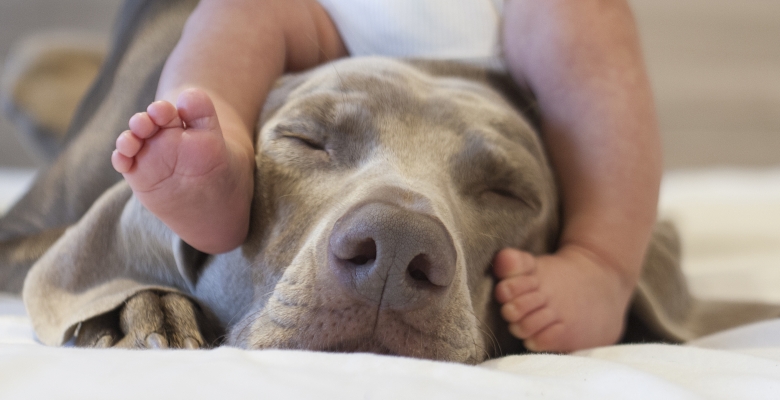Babies and pets, friends for life
Pets are part of the family. You love and spoil them just like everyone else. They’re so adorable! So when the family grows, they have to adapt too. You’ll behave differently when baby arrives. Your pet will experience new sounds and smells, and there’ll be less time for playing and walks. But there’s nothing that can’t be solved with patience, love and expert support. Little by little, baby and your furry friend will become best friends.

Here are a few ideas to help achieve harmony in your home:
- Prepare your pet during pregnancy. Like us, domestic animals have routines that keep them calm and reassured. And they notice changes in their lifestyle. While you’re pregnant, it’s a good idea to allow them to approach and sniff the pushchair, to help them get used to it. The same is true for the baby’s room. Let them go in and nose around, but establish clear rules on how they can behave in there. Correct your pet before baby’s born.
- Intensive care. Take your furry friend to the vet to get their nails clipped, to check they are parasite-free and to ensure that their vaccines are up to date. If they’re in good shape, you’ve no need to worry. And ask your doctor for advice if baby turns out to be allergic to your pet. Prevent little ones from playing with pet’s toys and approaching their food bowls. Science has shown that babies who live with a dog before the age of one are 13% less likely to suffer from asthma.
- Plan ahead. If you’re not going to be able to walk your dog as often as before, make sure someone else will do it for you. Try not to neglect your pets. Now is a good time to make the most of this new phase. If you want to change things - move your pet into another room for example, do so gradually, and reward them when they go to their new spot. It will become their refuge.
- Expert advice. If you know your pet doesn’t like children, seek professional help. Find an animal behaviour expert and ask them to observe how your pet behaves around your little one. Dogs learn by association and other children may have hurt or scared them. Don’t worry, experts are there to help. Pets usually get on well with little ones, problems are rare.
- Time for introductions! Your pet probably won’t have seen you for a few days and may be euphoric that you’re back. If possible, wait to greet them in a quiet bit of the house, give them an affectionate stroke and show that you’re calm. Bring the baby down to their height, but don’t lay them on the floor. Allow your pet to nuzzle in and even lick baby’s toes (no more!). Don’t punish their natural curiosity and reward calm behaviour with a little food and a good stroke. Don’t force them to interact. This initial meeting can be very brief, just a few minutes long. Then move on to something else.
- Avoid jealousy. Dogs learn by association. And so do humans. So ask visitors anxious to meet the baby to pay a little attention to your pet too, they aren’t used to being ignored. You also have to remember to give them enough attention - make sure you play with, stroke and treat them while you’re with baby. Don’t just give them all your attention when baby’s not around!
- Don’t force things. Pets tell you when they’re looking for peace and quiet. They turn away, lick their muzzles, look elsewhere, yawn, and move around slowly when they want to be left in peace. And babies need to leave them alone at such times. Little ones will gradually learn to respect your pet, their space, language and way of seeing the world. They’re independent too.
- Watch out for strength! Until the age of two, babies learn about the world through touch. They grab onto anything and everything. And they’ll want to stroke your pet in their own sweet way: without controlling their own strength, pulling ears and sticking their fingers into eyes. So you have to teach little ones how to touch pets, the areas to avoid and how to be gentle.
- Never leave your baby alone with your cat or dog, even when they’re the best of friends and the kindest of creatures. Just never leave them alone. An adult must always be on hand to supervise their encounters, games and shared spaces. You need to stop babies pestering pets and take them away if your furry friend is getting fed up. If you leave them alone, you put both at risk.
- Remember the countless benefits of having a pet. Your little one’s self-esteem will be strengthened, they will learn empathy and feel loved and protected. Their bond with your pet can become very strong - they will take care of each other. Children who live with pets have been shown to be more socially spontaneous, and may be less stressed or anxious. Stoking, playing and exercising together are positive for them both.
Young children are hungry for stimuli. Living with a pet is a great gift to your baby. Use these tips and make sure you supervise their time together.



